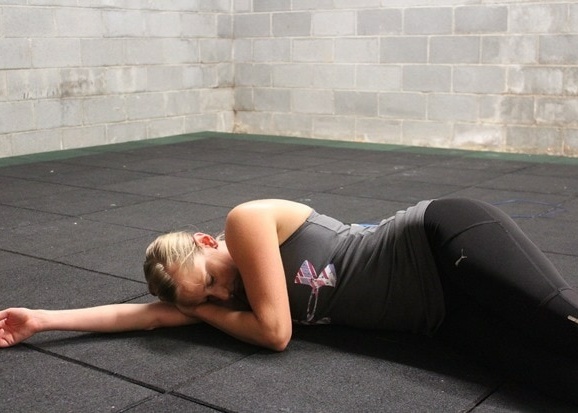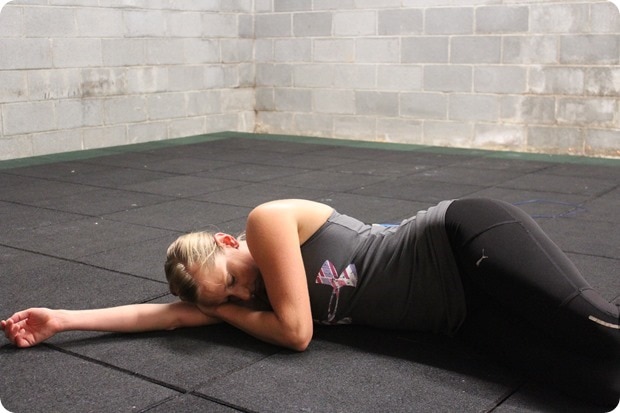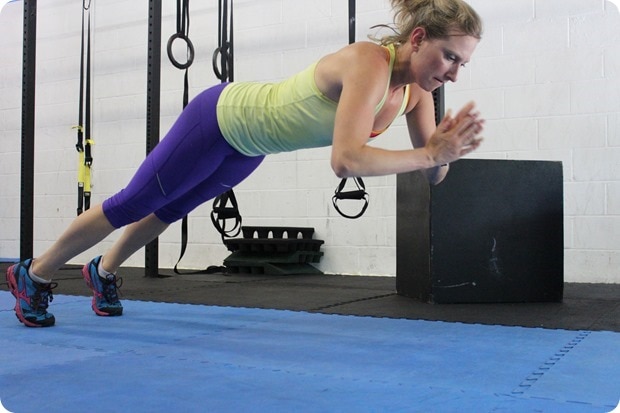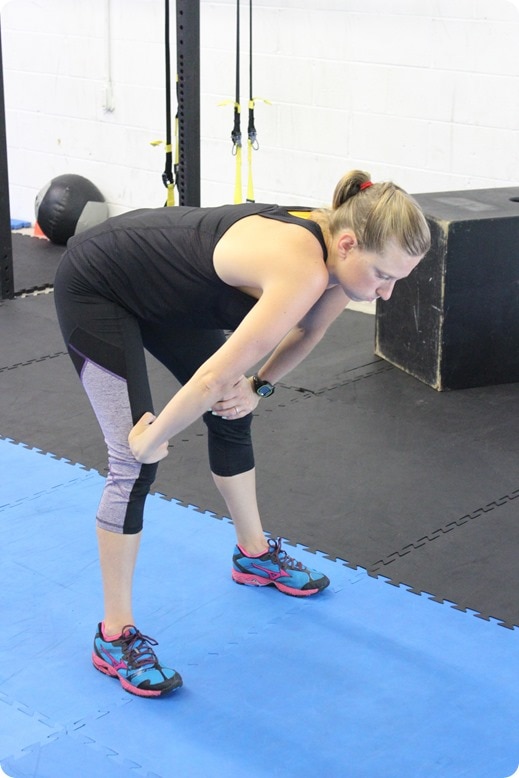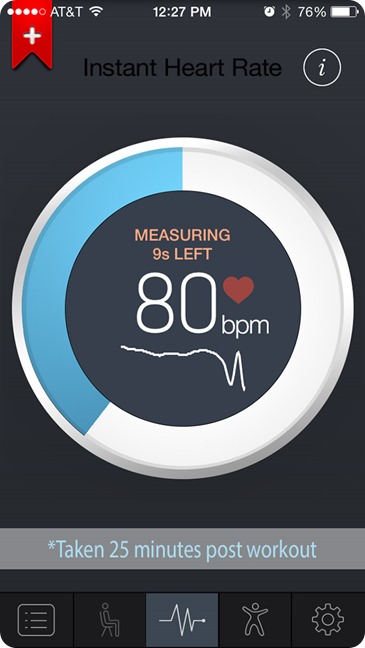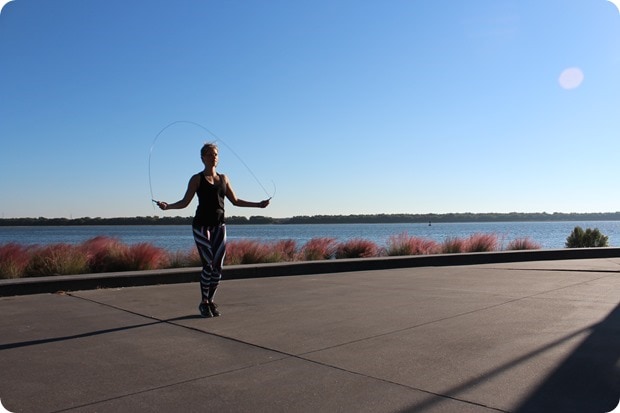Morning friends! I’m off on a press trip this morning (to a super cool spot… you can see a preview of what I’m up to on Instagram!), so I’ve asked blogger and personal trainer Taylor Ryan of Lifting Revolution to pop in to share a guest post with you all today. One thing I’ve been working a lot with my AnneTheRD clients on lately is taking care of themselves. In some cases, that means encouraging the client to add exercise in as their “me time” – their alone time to de-stress from their hectic lives. For other clients, that means encouraging them to take a step back from intense workouts; to remember that rest days are just as important as workout days as far as your training is concerned. I’m a big believer in the importance of the rest day – not only in being sure to take one every single week, but also in adding on additional days as necessary. I felt wiped earlier this week, actually, and took Sunday, Monday, and Tuesday off. Listen to your body, my friends!
That said, I’m happy to have Taylor here today to share more information about why it’s so important to honor the rest day, and how to know when to take a bigger step back every once in awhile, too.
How to Know When You Need a Rest Day (or Week!)
by: Taylor Ryan
I want to thank Anne for asking me to drop in today and share my passion for fitness! I’m Taylor Ryan, and I blog over at Lifting Revolution. I’ve been a personal trainer for 7 years now and can’t imagine doing anything else! Though I won’t lie, following Anne as she was on her journey to become an RD almost had me convinced to go back to school!
Almost.
So since I am still a personal trainer (and not an RD), Anne asked if I would share some tips and cues on how to know when your body needs (not wants, but requires) a rest. Namely:
- How do you know when you need to take an extra day off?
- Is doing “a little something actually better than doing nothing at all?
- And what is more important that exercise?
First things first…
We live in an age of over abundance. Moderation? Ha! That’s tough for our society.
When it comes to exercise, we’ve been led to think that if a little exercise is good, then a lot of exercise must be fabulous.
But that’s only one piece of the puzzle.
There is no denying that exercise becomes addicting. Maybe not at first, but once it has become a part of our daily life, it becomes something we crave. We want more, and we (yes, especially me) feel guilty if we don’t get a sweat session in. Just the idea of taking a unplanned day off from the gym is enough to cause heart palpitations and sweaty palms.
But guess what? Sometimes we need to take a step back and say “enough right now, I need a break.” Even if that break is just a day.
What’s amazing is that taking a day off, or even a week, won’t change your body. You won’t wake up 10 pounds heavier or look in the mirror to see your tone has melted away like hot wax dripping down the side of a candle.
Ask any great athlete and they will confirm this. In fact, they’ll agree that around every 12 weeks, they take a full recovery week. The body is able to handle about 12 weeks of focused, hard training before saying enough is enough (source). It’s at this point that the body can turn on itself and all these amazing results you were achieving just freeze or even reverse.
And if it hasn’t been 12 weeks? It doesn’t matter, sometimes you just have an off week and you need to back off.
The problem is that some of us don’t realize we’re in a state of overtraining until it’s too late. Here are some potential signs of overtraining:
- You used to sleep like a baby; now suddenly you can’t remember the last time you got a solid night’s sleep.
- Irritability, tiredness, or a change in appetite – these can be caused by hormonal changes triggered by poor recovery.
- Changes in or absence of your menstrual cycle.
- Decreases in your athletic performance, like feeling sluggish or overly tired during workouts.
Plus, overtraining can wreak havoc on your musculoskeletal system, resulting in injuries such as stress fractures, inflamed tendons, ligament strains or tears, and more. In this case, you won’t be taking just a day or week off; you could be sidelined for months.
I know all of these symptoms far too well. I’ve been there and I know it’s absolutely no fun. At. All.
Don’t wait until you get injured – take care of yourself now. Here are 5 questions you can ask yourself to determine if you need to take an extra rest day.
5 Ways To Know If You Need To Take A Rest Day From Exercise
1. Are you sore?
We all love waking up with a little big of muscle soreness as a sign that we worked hard and had an effective workout. A little bit of soreness is fine, but if you are sore to the point that you’re experiencing limited range of motion or doing simple movements causes discomfort, take a rest day. Go for several light walks, take a very light yoga class and hydrate to help the muscles recover.
DOMS (delayed onset muscle soreness) can cause injuries due to poor form and limited range of motion. Sometimes, it’s just not worth pushing through the pain.
2. Did you get a restless night of sleep?
Results from a workout don’t happen during a workout – they happen during sleep! A restless night can cause havoc on hormones, alertness and fitness performance. A new study confirmed that people with sleep apnea have an “impaired fitness capacity” compared with that of healthy sleepers.
In our go-go-go society, 3 out of every 10 Americans get less than the recommended 6-8 hours of sleep per night. While one night of bad sleep may not affect you, if you have had a couple of rough nights, skip the workout and use that hour to gain an extra hour (or two) of sleep.
3. Do you feel weak or “off”?
This is personally my best indicator. I’m not often sore yet sometimes I start into a workout and feel as if every move takes 10 times the amount of energy than it should. Doing a simple push-up feels as if I am sporting a weighted vest, and jogging 200 meters feels like a mile. This feeling normally comes after I’ve had 2-3 really strong workouts within the past 4 days.
What do I do? I shrug it off, stop the workout and change it on the spot. A walk, a yoga class, or even a trip by to my car to go home. Seriously, there is nothing wrong at all with listening to your body and cutting a workout short.
4. Is Your Resting Heart Rate Up?
I love quantifiable data. I’m a numbers person and I love when numbers can show us what we need to know. It’s one thing to think we are over doing it, it’s another to actually know we are. And your heart rate can do just that (so can your blood pressure, but who has a blood pressure cuff at home?). If your resting heart rate is up then it’s likely your body hasn’t fully recovered yet. Of course there are a few rules for this test to work:
- You have to know your true resting heart rate. Take your heart rate 3-4 mornings in a row, right after you wake up (without an alarm clock preferred) and still in bed. It’s best to do this on a week where workouts aren’t strenuous. I use an app called Instant Heart Rate on my iPhone.
- Once you’ve established your true resting heart rate, you can test out the theory.
- If you wake up and your heart rate is 10+ beats faster then normal, it’s likely you’re in a state of overtraining or under recovered. Scale back on your workouts and focus on relaxation and stretching to aid in faster recovery!
5. Are you just not that into it?
Exercise is supposed to add to our lives. It’s supposed to make it better and it’s something we should look forward to. If you normally do love getting in a sweat, but wake up one day feeling as if a trip to the dentist’s office sounds better than going to the gym, then take that as a sign that you need a break for the day. Guilt-free. We all deserve a break and even if it says “SPIN CLASS” on your calendar, break your date.
Changes brought on by exercise such as hormone levels, inflammation and muscle fatigue all play a role in this feeling. It’s your body’s way of telling you to chill out for a day. Listen to it. If you don’t want to workout one day, don’t. Maybe the idea of going on a bike ride with a friend, or walking the block with your dogs sounds better.
Does this all make sense?
Of course there are other signs for long term over-training because each of us reacts differently; lack of sexual desire, depression, and loss of hair come to mind, just to name a few more. But the point is to pick up on the signs and symptoms before over training becomes a problem. If you do, you’ll remain in a healthy place with your fitness and your body.
So: if you haven’t taken a break from training (4+ workouts/week) for at least 12 weeks, it’s time. Enjoy a complete week off from structured workouts! And at the very least, make sure you are always taking 1 full rest day per week – and additional ones as necessary, per the guidelines above.
And what about exercise guilt?
Push it out of your mind. Realize that more important than exercise is sleep and food. Sixty percent (estimated) of your results comes from the food you eat. So focus on following Anne’s intuitive nutrition advice, listen to your body for your workouts and you will be great.
One missed workout or even a week of missed workouts won’t change where you are. It takes roughly 1-2 weeks to lose cardiovascular fitness (due to a decrease in mitochondria and VO2 Max). But even if you do feel “out of shape,” the body remembers where you were and will get you back to that level within just a few workouts. But the really great part will be that you’ll feel fresh and recovered, allowing you to push beyond that previous level to become even stronger.
Listen to your body! It will tell you what it needs. It took me years to listen, but after stress fractures and exercise anxiety, I finally learned to stop ignoring it and I hope you do too!
Thanks so much again for letting me pop in today! Feel free to get more exercise tips and workouts over at my blog, Lifting Revolution! Have a wonderful day!


